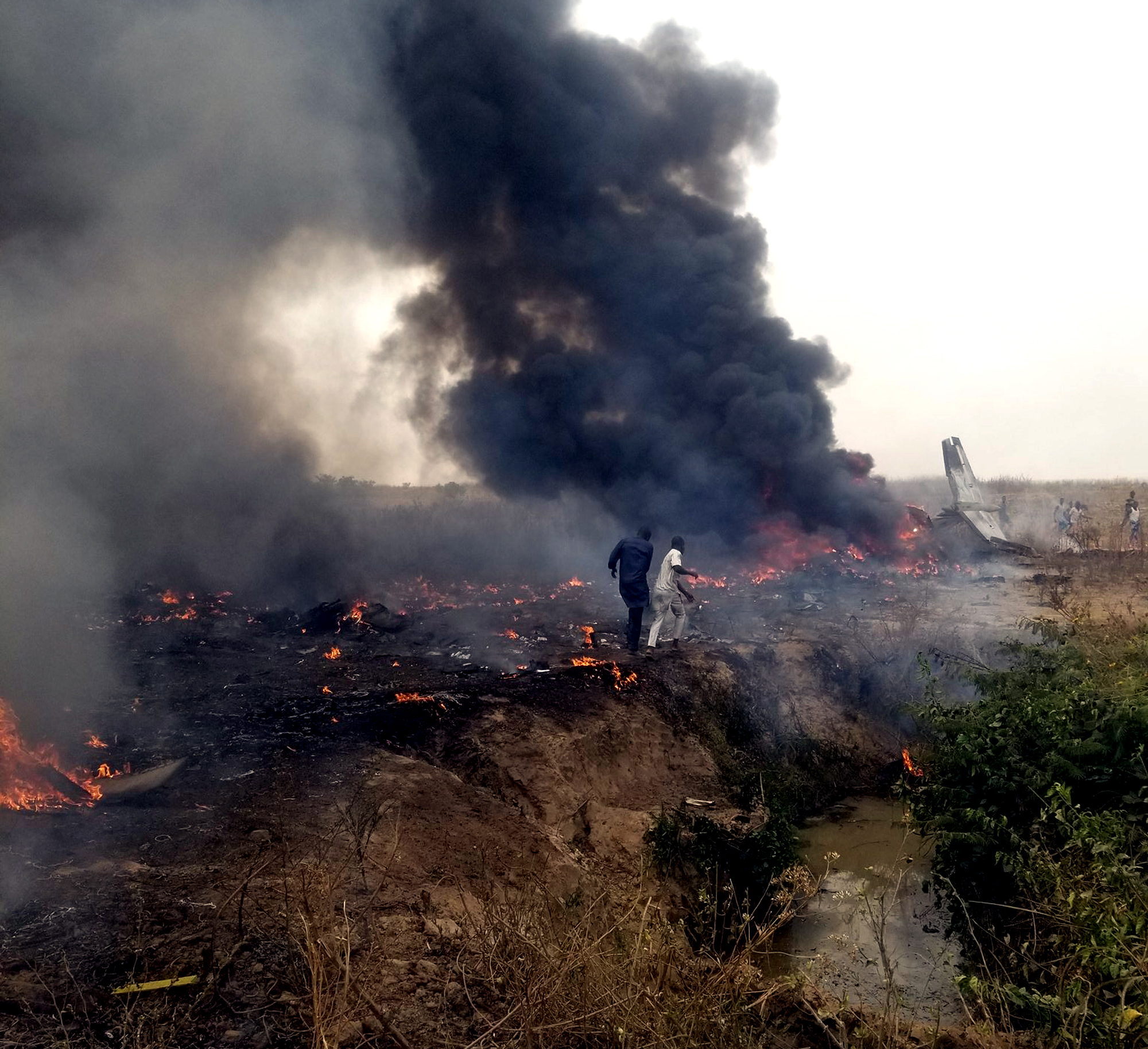Health
Fortify, WBFA Partner to Mitigate Iron Deficiency, Maternal Mortality in Africa

By Mathew Dadiya, Abuja
Fortify, a U.S based foundation and Nigeria-Wellbeing Foundation Africa (WBFA) have signed a partnership to address iron deficiency in West Africa.
Iron deficiency has been described as the major underlying cause of maternal deaths during childbirth in developing countries; affecting at least one-third of the global population.
Wellbeing Foundation Africa, in a statement on Thursday, by its Head of Communications, Shola Ayelabola, said that it has mobilised substantial resources to support Fortify’s work in ending maternal mortality in West Africa.
The collaboration combined private sector ingenuity with local know-how and leadership to save the lives of millions of women and children suffering from iron deficiency
According to the Foundation, in addition to its deep relationships with governments and institutions in West Africa and globally, WBFA has the infrastructure and network to educate community health workers and families about the potentially life-saving benefit of consuming this improved version of tomato paste, a West African staple.
Fortify’s Founder and CEO, Nancy Martin Sadi, “Joining forces with the Wellbeing Foundation at this juncture could not be better timing. Now that iron-fortified tomato mixes are reaching even the most rural villages, we can jointly work to help educate health care workers and women about the importance of adding iron to their diets.”
“Mrs. Saraki has been a leading voice in maternal, newborn and child health in Nigeria since serving as the First Lady of Kwara State in 2003, and knows how to reach and educate stakeholders at every level in Nigeria. She is also a recognized global voice for women, newborns and children, advising multiple organizations including the World Health Organization and the United Nations. We are especially pleased that Mrs. Saraki has recently accepted our invitation to serve as a member of Fortify’s Advisory Council.”
On her part, Mrs. Toyin Saraki said, “When we began discussions with Fortify, I was struck by how elegant yet practical a solution this is for iron deficiency anemia in that tomato paste is already built into the food supply and is a big part of meals every African eats.”
”In the absence of adequate interventions, Fortify works to drive innovation in the private sector, guiding companies to add iron to everyday meals through the fortification of simple, healthy foods consumed by most families.
”The World Bank and the Copenhagen Consensus have both ranked food fortification as one of the best investments in development in terms of cost effectiveness. According to the World Health Organisation (WHO), food-based approaches represent the most desirable and sustainable method of preventing micronutrient malnutrition.
”Fortify’s efforts with leading food producers have already resulted in the monthly production of 20 million sachets of iron-fortified tomato paste varieties in Nigeria alone – an historic milestone in food fortification as it is the first-ever, iron fortified tomato-based product. Production and distribution in Ghana are expected later this year, ” the statement read.
“According to the WHO the benefits of ending iron deficiency anemia are substantial as timely treatment can restore personal health and raise national productivity levels by as much as 20%,” she continued.
“This new initiative will engage with First Ladies and policymakers across Africa in accelerated efforts to eradicate iron deficiency. I know how much impact First Ladies in Africa can bring to women, families and communities, particularly in improving maternal health outcomes due to their highly visible advocacy. Together, the Wellbeing Foundation Africa and Fortify are determined to end the devastating effects of iron deficiency on women and their families.”
Iron is the essential element necessary for building blood. In developing countries, the main cause of iron deficiency is low iron bioavailability of the diet. Premenopausal women are particularly vulnerable due to iron loss in menstrual blood and the increased iron demands of pregnancy.
The overall global prevalence of anemia is just over 40% among two highly vulnerable populations: women aged 15–49 years and children under the age of five. In developing countries, the prevalence exceeds 50%. Iron deficiency can lead to premature labor, intrauterine growth retardation, low birth weight of the infant, birth asphyxia, neonatal anemia, and death (of both the mother and the child).- The consequences of iron deficiency not only affect personal health, but the economic health of communities and countries as well.
The Wellbeing Foundation Africa was founded in 2004 by Her Excellency Mrs. Toyin Ojora Saraki with the aim of improving health outcomes for women, infants, and children.
It combines programs with advocacy work in Nigeria and around the world.
Health
Teaching Hospital Performs 2nd Kidney Transplant in Maiduguri

The University of Maiduguri Teaching Hospital (UMTH), has successfully performed its second living-donor kidney transplant, 15 years after its first living-donor kidney transplant
The Chief Medical Director (CMD) of the UMTH, Prof. Ahmed Ahidjo, made this known at a news conference on Wednesday in Maiduguri.
“This is not the first time UMTH is doing the transplant.
The first time UMTH conducted a kidney transplant was in August 2010 and now the hospital has come back with full force to resume the excercise,” he said.Ahidjo also announced that the already 20 patients were admitted awaiting surgery on the same kidney transplant.
He appealed to donors to contribute funds to support the have not patients who needed the surgery so dearly.
The CMD said that though, the hospital provided free services being a federal government facility, adding that the patient’s dialysis had been subsidised by the government by reducing everything to N12,000 which was less than eight dollars compared with 1,000 dollars charged for same dialysis elsewhere.
Ahidjo said that the target was to make transplant one of the cheapest in West Africa, saying their facility was largest in the country with a capacity to accommodate up to 85 patients at once.
“UMTH has four fully equipped theatre rooms. All for kidney transplant which were fully equipped with modern equipment,” the CMD said.
He, however, commended TETFUND for its support to the hospital in terms of equipment and other infrastructure.
Ahidjo also commended Gov. Babagana Zulum of Borno for donating N50 million to the hospital to carry out research on causes of kidney related diseases in the North-east.
The CMD said that some of the research findings revealed that diabetics, hypertension and dehydration were linked with the kidney related diseases in the region.
“The causes of kidney issues for now are diabetics, highpertension and exact causes are not yet known but many samples were taken to laboratories and the result is awaited,” Ahidjo said. (NAN)
Health
WHO Declares Mpox Public Health Emergency Concern

The World Health Organisation (WHO), says said the Mpox upsurge has continued to meet the criteria of a Public Health Emergency of International Concern (PHEIC) set forth in the International Health Regulations (IHR).
Dr Tedros Ghebreyesus, WHO Director-General said this in a statement.
Ghebreyesus said the announcement followed the fourth meeting of the IHR emergency committee regarding the upsurge of mpox, held on June 5.
According to him, the committee, recognising progress in the capacity to respond in certain countries, advised the WHO boss that the event continues to constitute a PHEIC.
He said that it was based on the continuing rise in number of cases, including a recent increase in West Africa, and likely ongoing undetected transmission in some countries beyond the African continent
“Ongoing operational challenges in responding to the event, including concerning surveillance and diagnostics, as well as a lack of funding, make prioritising response interventions challenging and require continued international support,” he said.
Ghebreyesus concurred with the committee’s advice and issued the committee’s revised temporary recommendations to Member States experiencing mpox outbreaks.
He said the recommendations will guide countries’ efforts to prevent and control spread of the disease.
According to him, the full report of the fourth meeting will be issued in the third week of June.
“The upsurge of mpox in the Democratic Republic of the Congo and its spread to neighbouring countries was first determined to be PHEIC by Ghebreyesus on Aug. 14, 2024.
“Since then, the committee has met on three additional occasions, each time, advising the director general that the event continues to constitute a PHEIC,” he said (NAN)
Health
First Lady, Remi Tinubu, Distributes 10,000 Professional kits to Midwives in South-East

Nigeria’s First Lady, Sen. Oluremi Tinubu, on Monday in Enugu, distributed 10,000 Professional Kits for midwives in South-East aimed improving healthcare delivery in the zone.
Flagging-Off the programme during her two-day official visit to Enugu State , the president’s wife said the distribution were for midwives in the Southeast States of Abia, Anambra, Ebonyi Enugu and Imo.
According to her, the event is to complement the ongoing Federal Government retraining of health workers to improve healthcare of Nigerians.
The programme was part of her Renewed Hope Initiative (RHI) aimed at improving the healthcare of Nigerians especially the vulnerable groups.
She said, “This is a training for 120,000 frontline health workers nationwide.
I have been told that 60,470 health workers have already completed their training.“In view of this, RHI procured 60,000 branded scrubs and 60,000 pairs of crocs as an incentive to encourage health workers”.
She added that, “Since the initial launch of RHI in January 2025, we have distributed 50,000 scrubs and pairs of crocs to five geopolitical zones, namely North Central, North East, North West, South South and the Southwest.
“Today, we are in Enugu to distribute the remaining 10,000, each of the crocs and scrubs”.
She explained that the donation towards it had been made possible through the general support of Anonymous Global Partners, dedicated towards achieving health outcomes for Nigeria citizens.
The first lady said that the donors were committed to supporting the Organisation of the African First Ladies for Development and the health sector in Nigeria and across the world with a specific focus on reducing infant and maternal mortality and morbidity.
“Tuesday by the grace of God, I will be launching the “Free to Shine Triple Elimination Campaign” for HIV, AIDS, Syphilis and Hepatitis B in Enugu.
“This initiative aims to promote healthier mothers, reduce new HIV infections amongst mothers of reproductive age.
“ It will also eliminate mothers through child transmission of HIV, AIDS, which is the vertical transmission and provide treatment for children born with HIV,” Tinubu said.
She said the RHI would be presenting an additional grant of N50 million to the First Lady of Enugu State, with a sum of N50,000 each to 1,000 women petty traders in Enugu State to recapitalize their existing businesses.
In her welcome address, the Wife of Enugu Governor, Mrs Nkechinyere Mbah, appreciated Tinubu for her commitment in building an inclusive society through RHI.
She said the initiative had significantly impacted countless lives across the nation’s diverse geopolitical zones.
“Your noble endeavour has brought succour and hope to communities that have long yearned for such intervention. Here in Enugu State, we are profoundly grateful for the transformative outcomes of RHI.
“Midwives are at the frontiers of maternal and child health. Empowering these important healthcare workers is crucial to the push to reduce maternal and under- five mortality rates radically,” Mbah said.
Tinubu also inaugurated the state-of-the-art Technical, Vocational Education, and Training College (GTC), Enugu.(NAN)




















